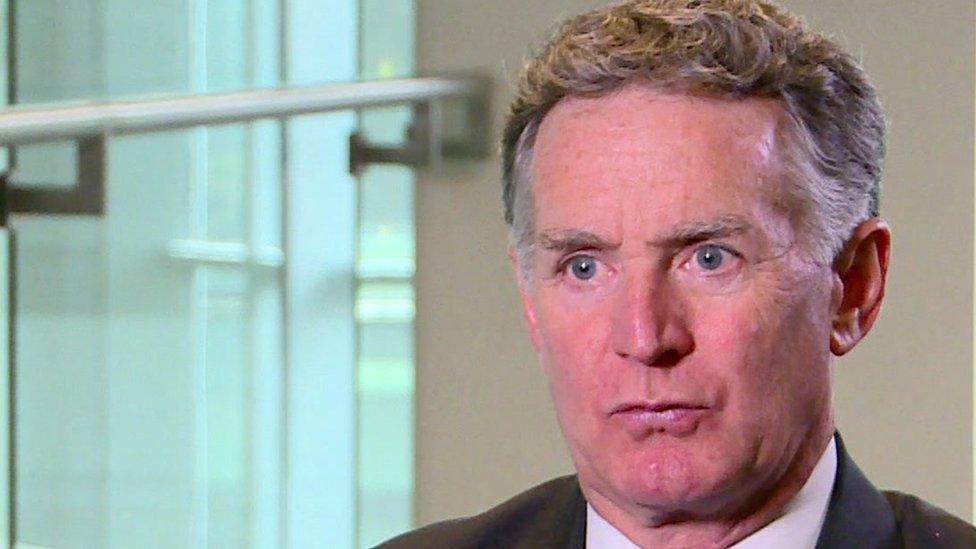What does a management consultant do anyway?
- Published
Those at the top say that you can learn a lot from external advisers, as long as you use them in the right way.
A consultant is someone who borrows your watch to tell you the time, and then keeps your watch, so the joke goes.
There are plenty of other ones along similar lines, all suggesting that what a management consultant does is charge people an awful lot of money for delivering something they already knew.
The fact that the jokes endure hint at the sense of controversy that surrounds the profession; what does a management consultant really do and more pertinently are they really worth their often exorbitant fees?
The Firm
McKinsey, known as "the Firm" to its staff, is one of the biggest and is arguably among the elite of the management consulting world. Its revenues totalled $8.3bn (£5.4bn) in 2014, and more current and former bosses of the world's largest companies are alumni of McKinsey than of any other firm.
Its advice has not been without controversy, but Dominic Barton, global head of McKinsey, raises his eyes to heaven at the mere mention of the watch joke. He's heard it many times before, but admits it still drives him crazy.
"We cost a lot of money and people are not going to spend money to waste their time. You can't build a firm on that basis," he says.

Management consultant fees run into the millions, but McKinsey boss Dominic Barton says increasingly clients only have to pay if they achieve the promised results
Mr Barton says the kind of projects the firm works on are hugely varied, from helping to determine what kind of business model a client should follow to restructuring programmes, building new products, growing new services and advising on management structure after two companies merge.
Contrary to the perception that the industry overcharges its clients, increasingly he says clients only have to pay if the management consultant firm delivers the results it has promised.
"We're saying we see a £100m impact opportunity here, to do that that's going to cost you £9m," he says.
"Please don't ask us how many people it takes. It's none of your business, actually. But we will deliver it. If we don't deliver that, we won't be paid."
The 'right model'
In some cases, when McKinsey works with smaller firms with annual revenues of £25m - companies which in the past it would rarely have got involved with - instead of a fee it will take a share of the company, which it then typically cashes in once the company floats on the stock market.
For the kind of work McKinsey does, Mr Barton says this method of payment makes a lot more sense than the traditional law firm model where companies are charged according to the seniority of the consultants involved and how many hours they spend on a project.
"Our associates love it. And then what I like about it too, is it puts us in the right model. I think it's a crazy system we have where we charge people on a leverage labour model. That somehow my value is somehow equated to how many hours I work times my per diem."
In contrast, John Veihmeyer who is global chairman of rival KPMG, says that in the future, he still expects "a significant portion" of the fees it charges clients to be based on the level of effort and time involved when working on a project.

KPMG's John Veihmeyer says technology has changed the way it charges clients
But he says the increasing use of technology to solve clients' problems has already had a significant impact on its fee model.
"We are, in more and more cases, solving client issues or helping them realise opportunities that they have, by bringing an asset-based technology solution to bear, rather than a traditional engagement of here's a lot of people spending a lot of time at your location helping you solve this problem."
If they're not overcharging, then is there any truth in the other main stereotype about management consultants: that they are often the henchman for a Machiavellian boss who wants to sack all his staff or carry out an unpopular project, but hasn't got the guts to do it himself?
Mr Veihmeyer laughs at the very idea.
"I don't think we ever want to be in a position where we're being asked to simply rubber stamp a conclusion that a company has already reached."
He believes that the key thing clients hire management consultants for is for the wider perspective and objective advice that they can offer.

Company bosses say management consultants can offer a different way of looking at a problem
It's something that Campbell Soup Company chief executive Denise Morrison says she has found useful when she's faced "really difficult" business issues.
"Working with some outside consultants or people that really can bring you an external perspective or a benchmarking to identify opportunities is a really good way to work," she says.
However, she says it's important that the consultants pass on their knowledge and ideas to staff effectively, making sure they don't become a permanent fixture.
'You have to evolve'
Not everyone agrees that management consultants can play this role well. Tim Brown, chief executive at design agency IDEO, says while there's always a role for an outside perspective, often the ideas offered by management consultants simply aren't original enough.
Instead, he says he tries to create the same wider perspective from within, hence its staff are sent on secondments to different international offices to ensure they experience different ways of working and living.
Mr Brown says the firm also aims to create an atmosphere where employees feel free to try new ideas out, regardless of whether or not they are successful.
"Whether you're a management consultancy, a design company, a HR consultancy you have to be evolving, and you have to hopefully be evolving faster than the customers that you work for if you're going to be valuable," he says.
This feature is based on interviews by CEO coach and author Steve Tappin for the BBC's CEO Guru series, produced by Neil Koenig.
- Published9 June 2015

- Published25 February 2015

- Published18 February 2015

- Published10 February 2015

- Published4 February 2015

- Published27 January 2015
